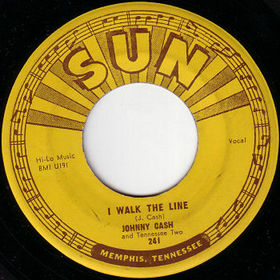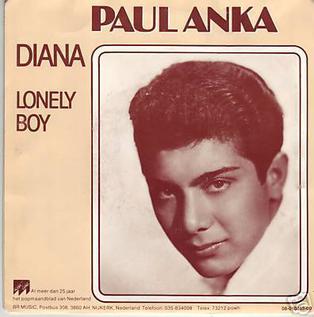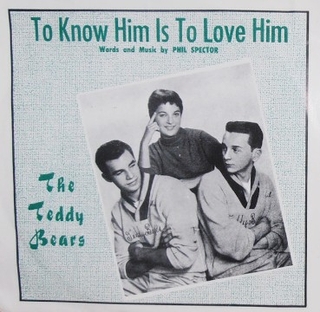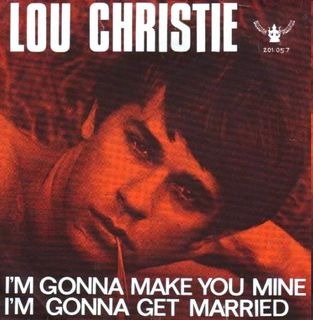Related Research Articles

"I Walk the Line" is a song written and recorded in 1956 by Johnny Cash. After three attempts with moderate chart ratings, it became Cash's first #1 hit on the Billboard charts, eventually reaching #17 on the US pop charts.
"Mountain of Love" is a song written by Harold Dorman. Dorman released his version as a single in 1960. It was originally recorded in late 1959 at the Royal Recording Studios in Memphis before the backing vocals were overdubbed. It performed well, spending 19 weeks on the Billboard Hot 100 chart, peaking at No. 21 in May 1960, while reaching No. 7 on the Billboard Hot R&B Sides chart, and No. 25 on Canada's "CHUM Hit Parade". The song was his only top forty hit on the Billboard Hot 100 and was the highest-charting single of his career.

"Diana" is a song written and first performed by Paul Anka, who recorded it in May 1957 at Don Costa’s studio in New York City. Anka stated in his autobiography that the song was inspired by a girl named Diana Ayoub, whom he had met at his church and community events, and had developed a crush on. Session musicians on the record included George Barnes playing lead guitar, Bucky Pizzarelli playing the "Calypso" riff on guitar, Irving Wexler on piano, Jerry Bruno on bass, and Panama Francis on drums. The song was recorded in May 1957 at RCA Victor Studios in New York. Backup singers included Artie Ripp.

"Take Good Care of My Baby" is a song written by Carole King and Gerry Goffin. The song was made famous by Bobby Vee, when it was released in 1961.

"The Battle of New Orleans" is a song written by Jimmy Driftwood. The song describes the Battle of New Orleans from the perspective of an American soldier; the song tells the tale of the battle with a light tone and provides a rather comical version of what actually happened at the battle. It has been recorded by many artists, but the singer most often associated with this song is Johnny Horton. His version scored number 1 on the Billboard Hot 100 in 1959. Billboard ranked it as the No. 1 song for 1959, it was very popular with teenagers in the late 1950s/early 1960s in an era mostly dominated by rock and roll music.
"Running Bear" is a teenage tragedy song written by Jiles Perry Richardson and sung most famously by Johnny Preston in 1959. The 1959 recording featured background vocals by George Jones and the session's producer Bill Hall, who provided the "Indian chanting" of "uga-uga" during the three verses, as well as the "Indian war cries" at the start and end of the record. It was No. 1 for three weeks in January 1960 on the Billboard Hot 100 in the United States and the same on Canada's CHUM Charts. The song also reached No. 1 in the UK Singles Chart and New Zealand in 1960. Coincidentally, "Running Bear" was immediately preceded in the Hot 100 No. 1 position by Marty Robbins' "El Paso", and immediately followed by Mark Dinning's "Teen Angel", both of which feature a death of, or affecting, the protagonist. Billboard ranked "Running Bear" as the No. 4 song of 1960. The tenor saxophone was played by Link Davis.

"To Know Him Is to Love Him" is a song written by Phil Spector, inspired by words on his father's tombstone, "To Know Him Was to Love Him." It was first recorded by the only vocal group of which he was a member, the Teddy Bears. Their recording spent three weeks at No. 1 on the Billboard Hot 100 chart in 1958, while reaching No. 2 on the UK's New Musical Express chart. Peter & Gordon and Bobby Vinton later had hits with the song, with its title and lyrics changed to "To Know You Is to Love You". In 1987, the song was resurrected by Dolly Parton, Linda Ronstadt, and Emmylou Harris, whose Trio recording topped the U.S. country singles chart.

"Just One Look" is a song co-written by American R&B singers Doris Troy and Gregory Carroll. The recording by Doris Troy was a hit in 1963. The Hollies, Anne Murray, Linda Ronstadt and Iain Matthews each achieved great success with the song. There have also been many other versions.

"Roses Are Red (My Love)" is a popular song composed by Al Byron and Paul Evans. It was recorded by Bobby Vinton, backed by Robert Mersey and his Orchestra, in New York City in February 1962, and released in April 1962, and the song was his first hit.
"There! I've Said It Again" is a popular song written and published by Redd Evans and David Mann in 1941. In early 1945, Vaughn Monroe and his Orchestra released Victor 20-1637, which reached the number one position on the Billboard's National Radio Airplay chart for five straight weeks, then no.2 for six more weeks, and a total run of 29 weeks. It finished 1945 as the no. 4 record of the year.
"Footsteps" is a hit single by the American singer and actor Steve Lawrence, recorded in January 1960 and released in spring 1960 by ABC-Paramount Records in the US and HMV in the UK. The song was written by Barry Mann and Hank Hunter.

"I'm Gonna Make You Mine" is a song released in 1969 by Lou Christie. It was featured on his 1969 album I'm Gonna Make You Mine, arranged by Stan Vincent and produced by Vincent and Mike Duckman.

"Forget Him" is a song written by Tony Hatch and released in 1963 by Bobby Rydell. The song spent 16 weeks on the Billboard Hot 100 chart, peaking at No. 4 on January 18, 1964, while it spent 14 weeks on the United Kingdom's Record Retailer chart, reaching No. 13. The song also reached No. 3 on Billboard's Middle-Road Singles chart, No. 3 on Canada's CHUM Hit Parade, No. 8 on the Irish Singles Chart, and No. 2 in Hong Kong.
"Feel So Fine" is a song released in 1960 by Johnny Preston. The song is a reworking of the 1955 song "Feel So Good" by Shirley & Lee, with modified lyrics.
"Pretty Blue Eyes" is a song written by Teddy Randazzo and Bobby Weinstein. In 1959, it was a hit single for Steve Lawrence, and in 1960 for Craig Douglas.

"Portrait of My Love" is a song written by Norman Newell and Cyril Ornadel, which was released by Matt Monro in 1960, and was an international hit for Steve Lawrence in 1961.

"So Sad (To Watch Good Love Go Bad)" is a song written by Don Everly, which was released by The Everly Brothers in 1960. The song was later a country hit for multiple artists in the 1970s and 80s.
"Like Strangers" is a song written by Boudleaux Bryant, which was a hit single for The Everly Brothers in 1960. The song was later a country hit for Gail Davies in 1980.
"Please Love Me Forever" is a song written by John Malone and Ollie Blanchard. The song was originally released by Tommy Edwards in 1958. Hit versions were later released by Cathy Jean and the Roommates in 1960 and Bobby Vinton in 1967.
"Just as Much as Ever" is a song written by Charles Singleton and Larry Coleman. The song was a hit single for Bob Beckham, Nat King Cole, and Bobby Vinton.
References
- ↑ Cradle of Love - By: Johnny Preston, MusicVF.com. Accessed July 25, 2015
- ↑ Aquila, Richard (1989). That Old-time Rock & Roll: A Chronicle of an Era, 1954-1963 , University of Illinois Press. p. 66. Retrieved April 4, 2018.
- ↑ JOHNNY PRESTON "Cradle Of Love" OldieLyrics. Accessed July 25, 2015
- 1 2 Hot 100 - Johnny Preston Cradle of Love Chart History, Billboard.com. Retrieved April 4, 2018.
- 1 2 "The Billboard Hot R&B Sides", Billboard , May 23, 1960. p. 42. Accessed October 14, 2015
- 1 2 Johnny Preston - Full Official Chart History, Official Charts Company. Retrieved April 4, 2018.
- 1 2 "Best Selling Pop Records in Britain", Billboard , June 13, 1960. p. 6. Retrieved April 4, 2018.
- 1 2 "CHUM Charts – Chart No. 158". CHUM. May 9, 1960. Archived from the original on November 7, 2006. Retrieved April 4, 2018.
- 1 2 Johnny Preston - Cradle of Love, norwegiancharts.com. Accessed July 25, 2015
- 1 2 David Kent, Australian Top 20 Singles - Week Ending April 30, 1960
- 1 2 "Billboard Music Week Hits of the World", Billboard , June 26, 1961. p. 39. Accessed December 17, 2015.
- ↑ "Belgian Newsnotes", Billboard , August 8, 1960. p. 6. Accessed December 17, 2015.
- ↑ Johnny Preston - Cradle of Love, Ultratop. Retrieved April 4, 2018.
- ↑ "Holland Newsnotes", Billboard , August 8, 1960. p. 6. Accessed December 17, 2015.
- ↑ Johnny Preston - Cradle of Love, Dutch Charts. Retrieved July 27, 2015
- ↑ "The Cash Box Top 100", Cash Box , May 21, 1960. p. 4. Retrieved April 4, 2018.
- ↑ "The Records Disc Jockeys Played Most", Cash Box , May 21, 1960. p. 20. Retrieved April 4, 2018.
- ↑ "The Nation's Top Ten Juke Box Tunes", Cash Box , May 28, 1960. p. 12. Retrieved April 4, 2018.
- ↑ Johnny Preston - Cradle of Love, Ultratop. Retrieved April 4, 2018.
- ↑ "Ray Pilgrim UK Releases", raypilgrim.co.uk. Accessed October 15, 2015
- ↑ "Ronnie & Robyn", soul-source.co.uk. Accessed September 7, 2023
- ↑ "Ronnie And Robyn - Cradle Of Love / Dreamin'", 45cat.com. Accessed September 7, 2023